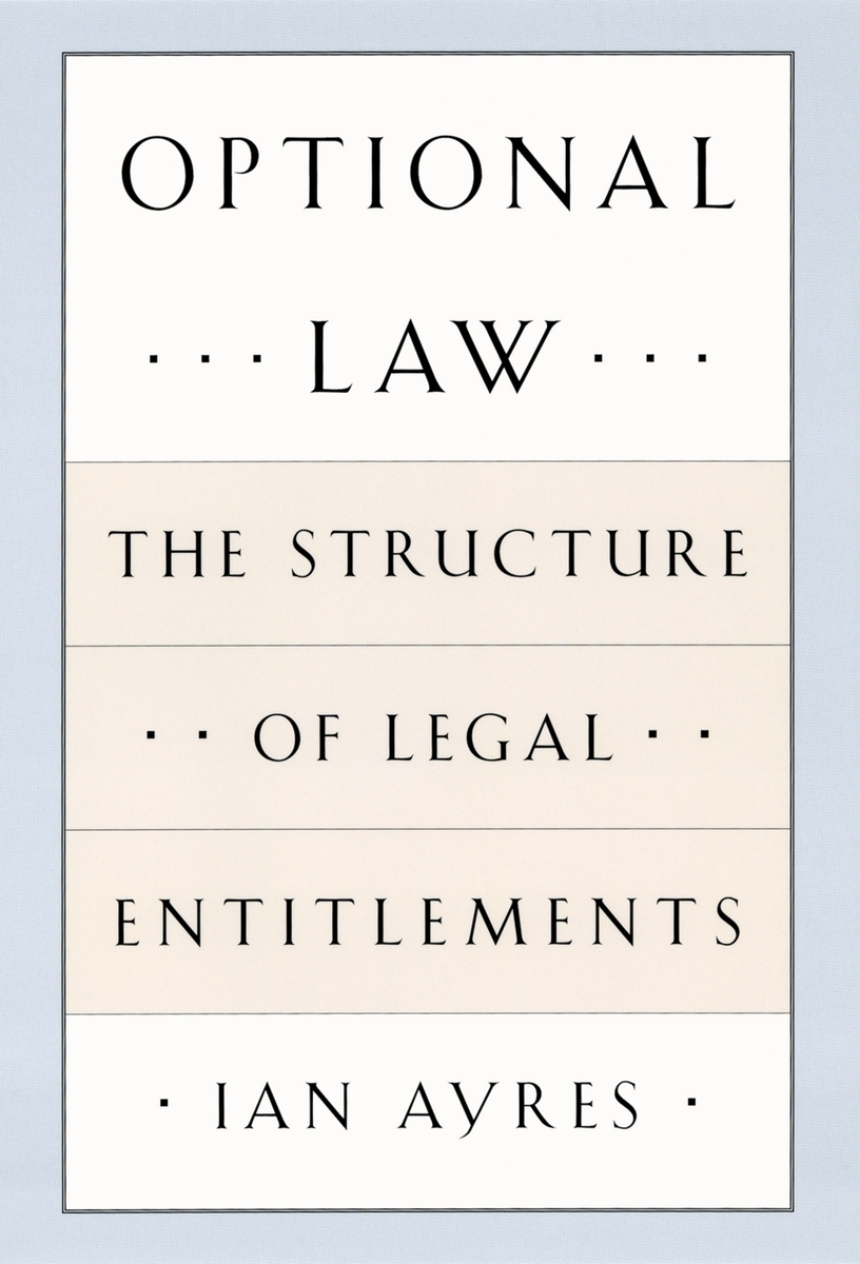Optional Law
The Structure of Legal Entitlements
Spurred by the advances in option theory that have been remaking financial and economic scholarship over the past thirty years, a revolution is taking shape in the way legal scholars conceptualize property and the way it is protected by the law. Ian Ayres’s Optional Law explores how option theory is overthrowing many accepted wisdoms and producing tangible new tools for courts in deciding cases.
Ayres identifies flaws in the current system and shows how option theory can radically expand and improve the ways that lawmakers structure legal entitlements. An option-based system, Ayres shows, gives parties the option to purchase—or the option to sell—the relevant legal entitlement. Choosing to exercise a legal option forces decisionmakers to reveal information about their own valuation of the entitlement. And, as with auctions, entitlements in option-based law naturally flow to those who value them the most. Seeing legal entitlements through this lens suggests a variety of new entitlement structures from which lawmakers might choose. Optional Law provides a theory for determining which structure is likely to be most effective in harnessing parties’ private information.
Proposing a practical approach to the foundational question of how to allocate and protect legal rights, Optional Law will be applauded by legal scholars and professionals who continue to seek new and better ways of fostering both equitable and efficient legal rules.
Ayres identifies flaws in the current system and shows how option theory can radically expand and improve the ways that lawmakers structure legal entitlements. An option-based system, Ayres shows, gives parties the option to purchase—or the option to sell—the relevant legal entitlement. Choosing to exercise a legal option forces decisionmakers to reveal information about their own valuation of the entitlement. And, as with auctions, entitlements in option-based law naturally flow to those who value them the most. Seeing legal entitlements through this lens suggests a variety of new entitlement structures from which lawmakers might choose. Optional Law provides a theory for determining which structure is likely to be most effective in harnessing parties’ private information.
Proposing a practical approach to the foundational question of how to allocate and protect legal rights, Optional Law will be applauded by legal scholars and professionals who continue to seek new and better ways of fostering both equitable and efficient legal rules.
264 pages | 16 line drawings, 25 tables | 6 x 9 | © 2005
Economics and Business: Business--Business Economics and Management Studies, Economics--Econometrics and Statistics, Economics--General Theory and Principles, Economics--Government Finance, Economics--Money and Banking, Health Economics
Law and Legal Studies: General Legal Studies, Law and Economics, Law and Society, Legal Thought
Reviews
Table of Contents
Preface
Chapter 1: The Bill of Options?
Part One: Bilateral Disputes
Chapter 2: Puts as Well as Calls
Chapter 3: Single-Chooser Rules
Chapter 4: Dual-Chooser Rules
Chapter 5: Higher-Order Liability Rules
Part Two: Extensions
Chapter 6: Correlated Values
Chapter 7: Multiple Takings
Chapter 8: Relaxing Other (Administrative, Informational, and Cognitive) Assumptions
Chapter 9: Bargaining in the Shadow of Different Regimes
Ian Ayres and Eric Talley
Chapter 10: Testing the Bargaining Model
Chapter 11: The Property/Liability Rule Debate
Notes
Index
Chapter 1: The Bill of Options?
Part One: Bilateral Disputes
Chapter 2: Puts as Well as Calls
Chapter 3: Single-Chooser Rules
Chapter 4: Dual-Chooser Rules
Chapter 5: Higher-Order Liability Rules
Part Two: Extensions
Chapter 6: Correlated Values
Chapter 7: Multiple Takings
Chapter 8: Relaxing Other (Administrative, Informational, and Cognitive) Assumptions
Chapter 9: Bargaining in the Shadow of Different Regimes
Ian Ayres and Eric Talley
Chapter 10: Testing the Bargaining Model
Chapter 11: The Property/Liability Rule Debate
Notes
Index
